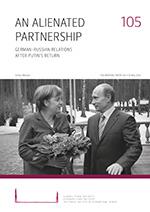The return of Vladimir Putin as Russia’s president and the probable end of Dmitri Medvedev’s modernization project will increase the alienation within German-Russian relations.
Germany’s modernization partnership with Russia has produced limited results because the two sides have different views on the cooperation. While the German side wants to develop common projects of good practice which will modernize the Russian economy and politics, the Russian side is interested in technology transfer.
The interest in and knowledge of Russia among German decision-makers is decreasing. Germany lacks vision and concepts on how to influence developments in Russia. This is also due to the resistance of the current Russian elite towards implementing political reforms.
As a result, Russia is losing its most important advocate in the EU (also regarding energy policy). This will have a negative impact on EU-Russia relations because the EU lacks leadership on Russia.
Ongoing changes in Russian society, which challenge the Putin system, will present an opportunity to find new allies in Russia for cooperation and modernization, which may increase Germany’s interest in its large neighbour. But this will call for a more balanced approach between the Russian elites and society in Germany’s Russia policy.

